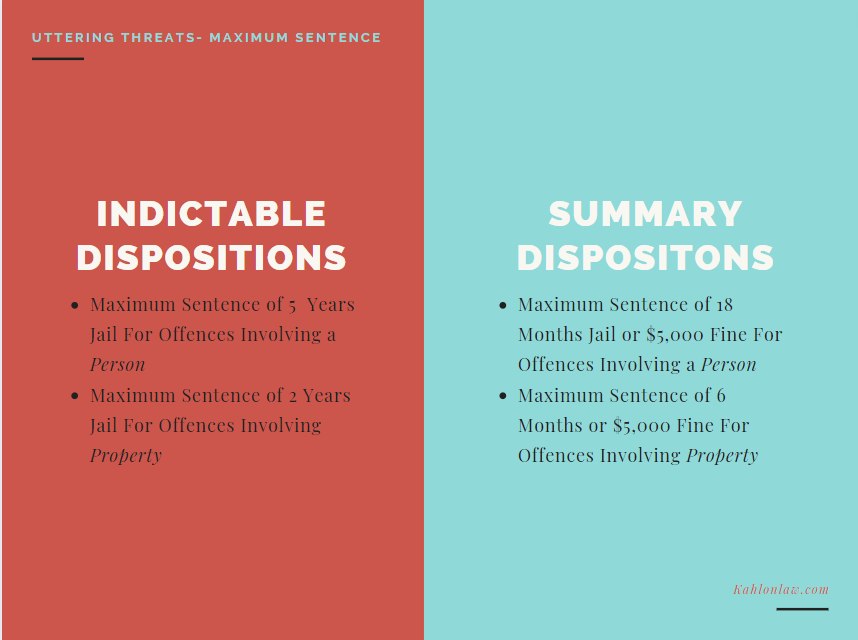- Practice Areas
Explore Our Practice Areas
Delve into detailed case studies across a variety of legal practice areas, showcasing our strategic defense and successful outcomes.

Delve into detailed case studies across a variety of legal practice areas, showcasing our strategic defense and successful outcomes.

Uttering threats is a criminal offence under Section 264.1 of the Criminal Code. In many situations, uttering threats is charged alongside additional offences such as assault or criminal harassment.
An uttering threat charge can arise from conflicts between individuals, domestic partners, or others. If a person threatens someone—whether in person, via social media, text message, or any other mode of communication—they can be charged with uttering threats.
The Crown Attorney must prove that the accused knowingly uttered the threat. The Crown does not need to prove that the accused intended to carry out the threat. In some cases, even silence can amount to a threat if it is accompanied by behaviour that makes the victim reasonably believe the silent person is conveying a threat. For example, making a gun-pointing gesture at someone in context could be considered such a threat. The test for whether an utterance constitutes a threat is a question of law, not fact.

An individual convicted of uttering threats can face serious consequences, including a criminal record, fines, and jail time. Although first-time offenders are unlikely to receive a jail sentence, repeat offenders may face imprisonment along with other collateral consequences. If you are facing criminal charges, including uttering threats, it is important to hire a lawyer who primarily practices criminal law and can provide strong legal representation. A criminal defence lawyer will carefully consider your case to explore and present all possible defences on your behalf.
If you have been accused of uttering threats, remember that you have the right to remain silent and should contact a criminal lawyer immediately. Do not speak to anyone, including the police, without first consulting an experienced criminal defence lawyer. Many defence lawyers offer a free consultation.
A peace bond is a criminal court order available to individuals who fear for their safety or personal property. It can help protect someone from further criminal conduct or violence by another person. Whether an uttering threats charge will be resolved through a peace bond depends on the specifics of the case and the accused. If the Crown believes a peace bond is an appropriate remedy, they will likely require some form of upfront therapy and/or community service. It is important to seek legal advice if you are facing criminal charges, including those related to uttering threats or entering into a peace bond.
If the complainant does not want to continue with the criminal proceedings, they can speak to the Crown prosecutor through victim services and convey their wishes. However, the decision to discontinue criminal proceedings is ultimately up to the Crown Attorney. The Crown will always consider the victim’s input; however, it is not a determinative factor. The Crown will weigh other factors such as the public interest and the strength of the evidence.
Often, the credibility of the complainant as to whether or not a threat was made is the key issue. At trial, the defence lawyer will cross-examine the complainant to try to establish any inconsistencies in their evidence. The Crown must prove their case beyond a reasonable doubt. Reasonable doubt can be raised by a number of factors, including the seriousness of the threat and the context in which the threat was made. There are a number of defences available to an individual charged with uttering threats, and it is important to speak with a criminal lawyer who can advise you on the best course of action. A lawyer will know how to present relevant evidence and arguments on your behalf so as to maximize your chances of a positive outcome. A criminal lawyer will help you understand the criminal process and what is required of you throughout your case so that you can make an informed decision about your best course of action.
It is important to contact a criminal lawyer as soon as possible if you are being investigated and/or charged with uttering threats. A criminal defence lawyer will be able to provide legal advice and guidance on how best to proceed throughout the criminal court process. If the police request to speak with you, it is important to contact a criminal lawyer prior to doing so. Everyone has a legal right to remain silent, and you should exercise that right. Remember, the police are not on your side, and anything you say to them can be used against you in court. Contact a lawyer for a free consultation.
We’ve Got the Answers. Call us now and speak directly with a lawyer.
